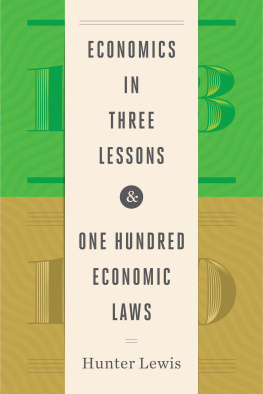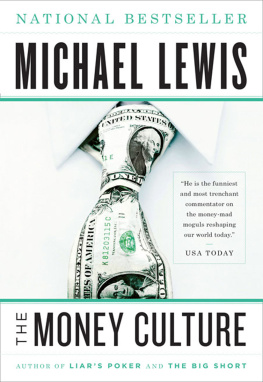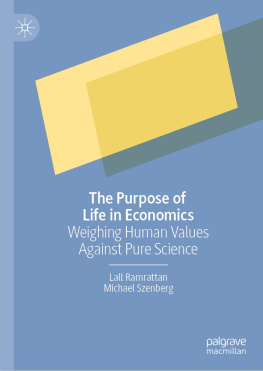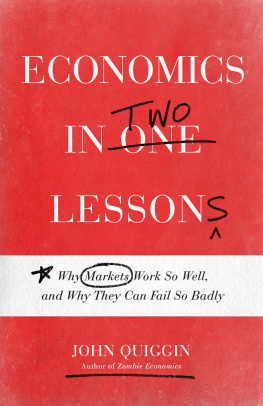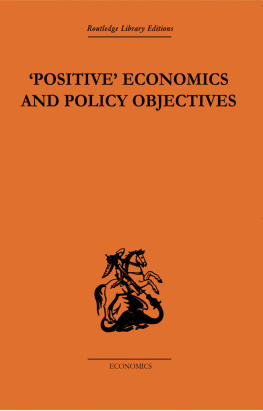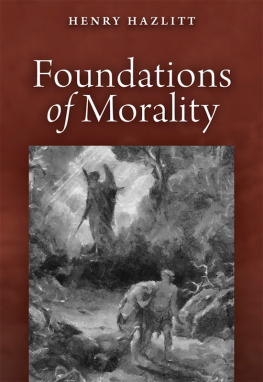[The] suffering [of poverty] is unnecessary because over the centuries a [market] system has been worked out to create the wealth of nationsall nations. To bring that system to all the worlds poor is... our chief unfinished business.
Chapter One
Henry Hazlitts Invaluable Insight
M ost of us would agree that the principal difference between children and real adults is that the latter look ahead, consider consequences, act responsibly and sustainably.
Sustainability is not, however, just the essence of maturity. It is, in addition, the essence of logic and of economics. Economics in the final analysis is grounded in logic. Good economics is always logical, which means that it is clear, orderly, organized, relevant, complete, consistent, and above all sustainable.
Economics is not directly about morality. But logic, economics, and the concept of sustainability have much to teach us about morality as well. In his book, Moral Foundations , the ornithologist, naturalist, and philosopher Alexander Skutch observed that:
People... might tell us that... morality... is not lying, not stealing, not killing, not coveting, not cheating, [not]... injuring ones neighbor. If asked what common feature unites all these interdicted activities, they would find it difficult to answer. They might say that all these forbidden activities cause people pain.... This is true enough, but...
Sustainability is not only the essence of maturity, logic, economics, and morality. It is also the foundation for human happiness. As the ancient Greek philosopher Epicurus wrote:
The... chief good is care in avoiding undesired consequences. Such prudence is more precious than philosophy itself, for all the other virtues spring from it. It teaches that it is impossible to live pleasurably without also living prudently, honestly, and justly; [nor is it possible to lead a life of prudence, honor, and justice] and not live pleasantly. For the virtues are closely associated with the pleasant life, and the pleasant life cannot be separated from them.
By far the best treatment of the theme of sustainability in economics is found in Henry Hazlitts masterpiece, Economics in One Lesson , a book published in 1946 that became a surprising best seller and that continues to instruct to this day. Hazlitt introduces his book as follows:
This book is an analysis of economic fallacies that... have... become a new orthodoxy... [despite] their own self-contradictions.... There is not a major government in the world at this moment... whose economic policies are not influenced, if they are not almost wholly determined, by acceptance of some of these fallacies. Perhaps the shortest and surest way to an understanding of economics is through a dissection of such errors, and particularly of the central error from which they stem.
He then continues in the book itself:
[That] economics is haunted by more fallacies than any other study known to man... is no accident. The inherent difficulties of the subject would be great enough in any case, but they are multiplied a thousand fold by... the special pleading of selfish interests.... While certain public policies would in the long run benefit everybody, other policies would benefit one group only at the expense of all other groups. The group that would benefit by such policies, having such a direct interest in them, will argue for them plausibly and persistently. It will hire the best buyable minds to devote their whole time to presenting its case. And it will finally either convince the general public that its case is sound, or so befuddle it that clear thinking on the subject becomes next to impossible.
In addition to these endless pleadings of self-interest, there is a second main factor that spawns new economic fallacies every day. This is the persistent tendency of men to see only the immediate effects of a given policy, or its effects only on a special group, and to neglect to inquire what the long-run effects of that policy will be not only on that special group but on all groups. It is the fallacy of overlooking secondary consequences.
In this lies almost the whole difference between good economics and bad. The bad economist sees only what immediately strikes the eye; the good economist also looks beyond. The bad economist sees only the direct consequences of a proposed course; the good economist looks also at the longer and indirect consequences. The bad economist sees only what the effect of a given policy has been or will be on one particular group; the good economist inquires also what the effect of the policy will be on all groups.
The distinction may seem obvious.... Doesnt every little boy know that if he eats enough candy he will get sick?... Do not the idler and the spendthrift know, even in the midst of their glorious fling, that they are heading for a future of debt and poverty?
Yet when we enter the field of public economics, these elementary truths are ignored. There are men regarded today as brilliant economists who deprecate saving and recommend squandering on a national scale as the way of economic salvation; and when anyone points to what the consequences of these policies will be in the long run, they reply flippantly, as might the prodigal son of a warning father: In the long run, we are all dead. And such shallow wisecracks pass as devastating epigrams and the ripest wisdom.
But the tragedy is that, on the contrary, we are already suffering the long-run consequences of the policies of the remote or recent past. Today is already the tomorrow which the bad economist yesterday urged us to ignore. The long-run consequences of some economic policies may become evident in a few months. Others may not become evident for several years. Still others may not become evident for decades. But in every case, those long-run consequences are contained in the policy as surely as the hen was in the egg, the flower in the seed.
From this aspect, therefore, the whole of economics can be reduced to a single lesson, and that lesson can be reduced to a single sentence. The art of economics consists in looking not merely at the immediate but at the longer effects of any act or policy; it consists in tracing the consequences of that policy not merely for one group but for all groups....
It is true, of course, that the opposite error is possible. In considering a policy, we ought not to concentrate only on its long-run results to the community as a whole. This is the error often made by the classical economists. It resulted in a certain callousness toward the fate of groups that were immediately hurt by policies....
But comparatively few people today make this error.... The most frequent fallacy by far today, the fallacy that emerges again and again in nearly every conversation that touches on economic affairs, the error of a thousand political speeches, the central sophism of the new economics, is to concentrate on the short-run effects of policies on special groups and to ignore or belittle the long-run effects on the community as a whole.
We have stated the nature of the lesson, and of the fallacies that stand in its way, in abstract terms. But the lesson will not be driven home, and the fallacies will continue to go unrecognized, unless both are illustrated by examples....

